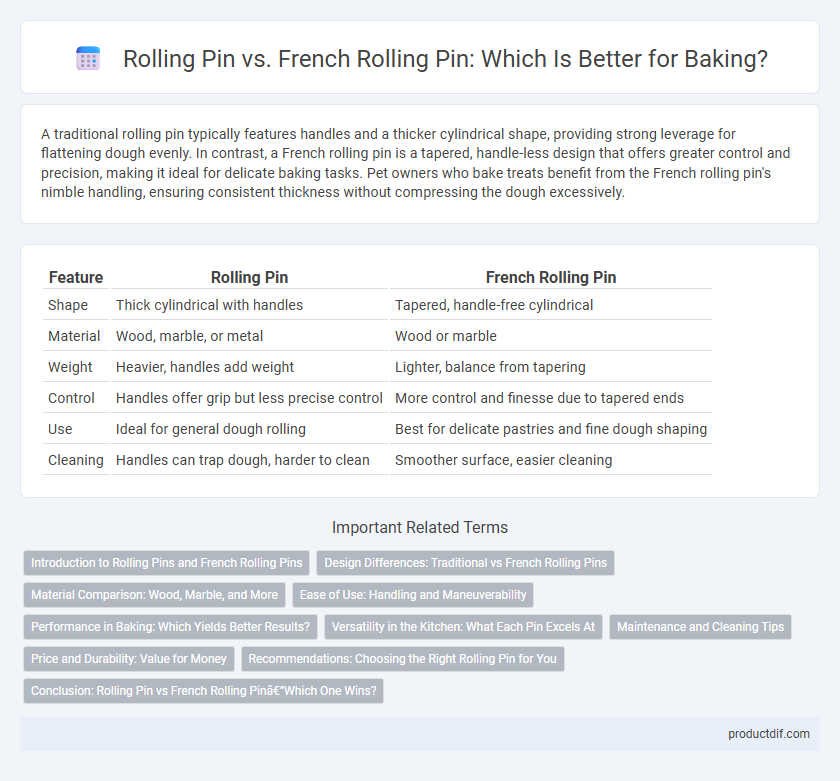A traditional rolling pin typically features handles and a thicker cylindrical shape, providing strong leverage for flattening dough evenly. In contrast, a French rolling pin is a tapered, handle-less design that offers greater control and precision, making it ideal for delicate baking tasks. Pet owners who bake treats benefit from the French rolling pin's nimble handling, ensuring consistent thickness without compressing the dough excessively.
Table of Comparison
| Feature | Rolling Pin | French Rolling Pin |
|---|---|---|
| Shape | Thick cylindrical with handles | Tapered, handle-free cylindrical |
| Material | Wood, marble, or metal | Wood or marble |
| Weight | Heavier, handles add weight | Lighter, balance from tapering |
| Control | Handles offer grip but less precise control | More control and finesse due to tapered ends |
| Use | Ideal for general dough rolling | Best for delicate pastries and fine dough shaping |
| Cleaning | Handles can trap dough, harder to clean | Smoother surface, easier cleaning |
Introduction to Rolling Pins and French Rolling Pins
Rolling pins are essential bakeware tools used to evenly flatten dough, available in various styles tailored to different baking needs. French rolling pins, characterized by their slender, tapered design without handles, offer enhanced control and precision for delicate dough tasks. Choosing between a traditional rolling pin and a French rolling pin influences dough texture and ease of use in pastry preparation.
Design Differences: Traditional vs French Rolling Pins
Traditional rolling pins are typically cylindrical with handles on either end, providing a consistent thickness for dough and increased control during rolling. French rolling pins feature a tapered design without handles, allowing for greater maneuverability and precision in applying pressure to specific dough areas. The choice between the two depends on personal preference and the desired rolling technique for various baking tasks.
Material Comparison: Wood, Marble, and More
Wood rolling pins offer durability and a lightweight feel, ideal for precise dough control, while French rolling pins, typically tapered and made of hardwoods like maple or beech, provide enhanced maneuverability and even pressure distribution. Marble rolling pins bring a naturally cool surface that prevents dough from sticking and softening, favored for pastry and pie crusts but heavier and less versatile for everyday rolling. Other materials such as stainless steel and silicone are available, with steel offering durability and temperature control, and silicone providing non-stick properties, each catering to specific baking needs and preferences.
Ease of Use: Handling and Maneuverability
A traditional rolling pin, with its thick cylindrical shape and handles, offers a comfortable grip that facilitates steady pressure and smooth rolling. The French rolling pin, tapering at both ends and lacking handles, provides enhanced maneuverability, allowing for precise control and easier adjustments during delicate dough shaping. Users often find the French style superior for tasks requiring finesse, while the traditional pin excels in applying even pressure for standard baking needs.
Performance in Baking: Which Yields Better Results?
French rolling pins, typically tapered and without handles, offer superior control and pressure distribution, enabling more precise dough thickness compared to traditional rolling pins. Their lightweight design reduces hand fatigue during extensive rolling tasks, making them ideal for delicate pastries and uniform crusts. Traditional rolling pins provide consistent pressure for robust doughs but may lack the finesse required for intricate baking performance.
Versatility in the Kitchen: What Each Pin Excels At
Rolling pins with handles offer excellent control for evenly flattening dough, making them ideal for tasks like pie crusts and cookie dough. French rolling pins, typically tapered and handle-free, provide superior maneuverability, allowing precise pressure adjustments perfect for delicate pastries and artisanal bread. Each pin enhances versatility in the kitchen by catering to different dough textures and rolling techniques.
Maintenance and Cleaning Tips
Rolling pins require regular cleaning with warm, soapy water and thorough drying to prevent wood cracking and bacterial growth. French rolling pins, typically made from hardwoods like maple, benefit from occasional oiling with food-safe mineral oil to maintain smoothness and prevent moisture absorption. Avoid submerging either type in water or placing them in a dishwasher to extend their lifespan and preserve the integrity of the wood.
Price and Durability: Value for Money
French rolling pins typically offer superior durability due to their solid hardwood construction, making them a long-lasting investment for baking enthusiasts. In contrast, standard rolling pins vary widely in price and material quality, often providing a more budget-friendly option but potentially compromising longevity. Assessing value for money depends on frequency of use and preference for control, with French rolling pins excelling in professional settings where durability and precision justify the higher cost.
Recommendations: Choosing the Right Rolling Pin for You
When selecting a rolling pin, consider the nature of your baking tasks and personal comfort; French rolling pins, with their tapered ends, offer greater control and precision for delicate doughs, while traditional rolling pins provide uniform pressure ideal for larger pastries. Material choice also impacts performance--wooden French rolling pins absorb less dough and ensure smooth rolling, whereas heavier, thicker pins can help flatten dense dough more efficiently. Prioritize ergonomics and dough type to ensure optimal results and ease of use in your baking routine.
Conclusion: Rolling Pin vs French Rolling Pin—Which One Wins?
The choice between a traditional rolling pin and a French rolling pin depends on baking style and dough type, with the French rolling pin offering greater control and precision due to its tapered design, ideal for delicate pastries and uneven doughs. In contrast, the classic rolling pin excels in rolling out larger dough surfaces evenly, making it suitable for bread and cookie doughs. Bakers seeking versatility often prefer the French rolling pin, while those prioritizing uniform thickness lean towards the traditional rolling pin.
Rolling Pin vs French Rolling Pin Infographic

 productdif.com
productdif.com